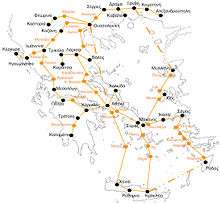Greek Research and Technology Network

The Greek Research and Technology Network or GRNET (Greek: Εθνικό Δίκτυο Έρευνας και Τεχνολογίας, ΕΔΕΤ) is the national research and education network of Greece. GRNET develops and provides advanced services of national and international internet access to the Research, Academic and Education communities of Greece, with its gigabit GRNET2 network and the Virtual NOC supportive scheme. The mission of the Greek Research and Technology Network GRNET/ΕΔΕΤ is the provision of high-quality international and national networking services to Greek academic and research institutions and to the public and private sector in support of their research and educational activities. GRNET also supports universities, Technological Education Institutes and over 9,500 schools via the Greek School Network .
Main Services
GRNET Main offices are located at 56 Mesogion Avenue in Athens, Greece, 37°59′13.10″N 23°45′56.95″E / 37.9869722°N 23.7658194°ECoordinates: 37°59′13.10″N 23°45′56.95″E / 37.9869722°N 23.7658194°E. GRNET services include:
- operates the Greek Internet Exchange (GR-IX), which provides local interconnection (peering) among all major Greek Internet Service Providers (ISPs).
- provides international interconnection among the National Research & Education Networks (NRENs) of Europe and the Internet through the research network GEANT.
- manages / participates in a number of Operational Programmes, such as the e-Business Forum and the Go Digital Training Support.The main objectives of these programmes include the promotion of Internet technologies, the exchange of opinions, ideas and expertise, and the endorsement of e-business knowledge accumulation, focusing on small and medium sized enterprises (SMEs).
- promotes the use and the development of open source software products in Greece .
- promotes the use of Broadband technologies in Greece.
Networking

GRNET develops and provides advanced services of national and international internet access to the Research, Academic and Education communities of Greece, with its gigabit GRNET2 network and the Virtual NOC supportive scheme. The network connects:
- 27 Universities
- 15 Technical Universities
- 33 Research Institutions and
- 12,673 schools to the Pan-European Research and Education Network, GEANT.
Grid Computing
GRNET's networking infrastructure serves as the foundation for advanced computing applications, taking advantage of the processing/storage clusters that reside in different parts of the country and sophisticated middleware developed by our European collaborators. The resulting computing grid is the subject of the HellasGrid national project, coordinated by GRNET. Additionally, GRNET is the coordinator of the SEE Federation for EGEE, the pan-European Grid infrastructure. Further on the international front, GRNET participates in the GRIDCC EU project for the integration of scientific instruments and the Grid.
Cloud Computing
GRNET provides cloud computing services to the academic and research community, in order to promote academic, educational and research aims. These services are hosted on GRNET's own infrastructure and fall into the category of Infrastructure as a Service (IaaS). More specifically, the following cloud services are provided:
- ~okeanos : Cloud Service with end users in the academic and research community powered by Synnefo , an IaaS cloud computing project.
- ViMa : Virtual Private Server (VPS) Service provided to GRNET peers for hosting of services.
High Performance Computing
GRNET has installed and operates the national supercomputing facility ARIS. ARIS is general purpose supercomputer with a total sustained performance of ~180 TFlop/s based on the Linpack Benchmark. ARIS was ranked 468th fastest supercomputer in the world on Top500 (June 2015 iteration). The system is available for open research to the Greek research and academic community. GRNET provides the necessary user support services and supervises the time allocation to the system.
e-Business and e-Learning
GRNET supports national and international actions which aim at the integration of e-Learning, Internet technologies and their use within the Greek business environment, with a focus on Small to Medium-sized Enterprises (SMEs). In this framework, GRNET coordinates the e-Business Forum project, the project for the educational support of the GoOnline programme and the EU-funded ELISA project.
International activities
GRNET participates actively in international projects funded by the European Union, including 6DISS, EUMedConnect, EUMedGrid, ForSociety, ACTION, and others, for the advance of digital technologies in Europe and the world.
South-Eastern Europe eInfrastructures
GRNET participates in regional and European projects which aim at bridging the digital divide between countries of the region and the rest of Europe. In this context, GRNET is coordinating the SEEREN project for building a high-speed regional network which extends GEANT to all the Balkan countries, as well as the SEE-GRID project to prepare the ground for the region to join the broader European Grid computing activities. Furthermore, GRNET is a partner in the SEEFIRE project which studies the existing optical networking infrastructure in SE Europe, in preparation for building a dark fibre network which will cover the whole region.
See also
External links
- grnet.gr/en - The Official site of GRNET (English)
- grnet.gr - The Official site of GRNET (ΕΔΕΤ) (Greek)